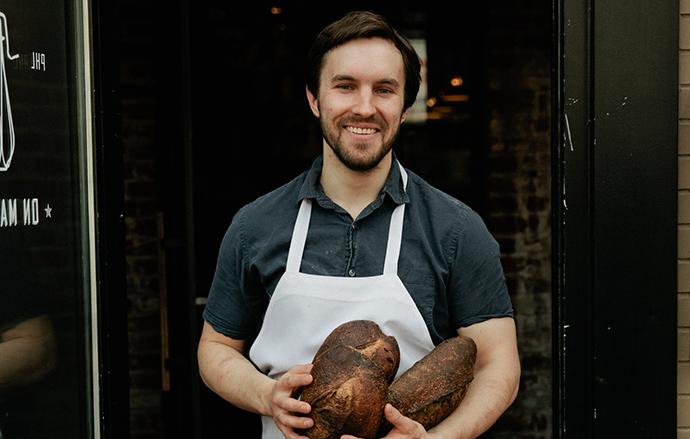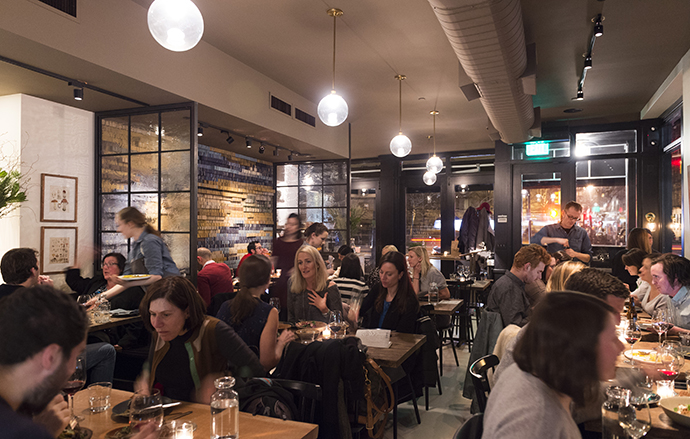Interview with JBF Award Nominee Alex Bois of Philadelphia's High Street on Market
Maggie Borden
Maggie BordenApril 18, 2016

Armed with a degree in biochemistry, Alex Bois left college determined to make his mark brewing beer, but a bout of Hepatitis E changed his life forever, redirecting his fermentation fervor away from hops and towards the humble loaf of bread. New York City and Philadelphia diners have been the lucky recipients of this happy accident, as Bois has won their hearts crust by crust with his wares at High Street Hospitality Group’s eateries. Read on to see what the 2016 JBF Award nominee for Rising Star Chef of the Year learned from his JBF Award–winning mentor Jim Lahey, what the French have gotten right about bread, and the best way to get a customer to try a new loaf.
--
JBF: Your mentor Jim Lahey is being inducted into the Who’s Who of Food &
Beverage in America this year. How has his philosophy on bread baking informed yours? What was the greatest lesson you took from your time at Sullivan Street Bakery?
Alex Bois: Jim’s philosophy on bread baking is informed by, and even reverent of, tradition—but will ultimately allow for any technique in his quest to create fantastic bread. Jim knows what he wants to produce and to eat, and won’t let conventional fads or the dogma of classical baking lead him astray. Every action in his bakery is intentional, with a carefully considered motivation and end result, without any bullsh*t or fluff. He also has a hell of a lot of fun baking, and an extremely contagious attitude. While the bread that I want to make is different from Jim’s, and thus needs a different methodology, his clarity of vision will always inform the way I think about making bread, and food, in general.
The greatest lesson I took from my time at Sullivan Street Bakery was not specifically about bread. We all have that moment out in nature on a crisp fall or spring day where the only thing that makes sense is to stop and fill our lungs with the fresh air. I had made it so far in life thinking that experience was special, that its power would fade with repetition. Arriving to work that first day at Sullivan Street, I was hit with an intoxicating blast of flavors in the air; chocolate-y burnt bran, pungent toasted sesame, the boozy and fruited funk of a ripe sourdough, and the soft sweetness of wheat. I didn’t think I could be so happy or fulfilled all at once, and I certainly could never have imagined I would experience that same feeling every time I opened those bakery doors.
JBF: Your parents are French, and you’ve spoken about growing up with high-quality bread in the home. What do you think is the difference between French and American bread cultures?
AB: The patchwork of cultures that creates American food leaves us with lots of starchy options to enjoy with our meals. Pasta, rice, and potatoes are all equally important accompaniments to our veggies and protein at dinner, while bread is much less common. It is mostly seen as an edible container for “sandwichable” items, rightfully taken for granted when it's the bland and texture-less product of the modern factory bakery. When my parents grew up, a visit to a favored boulangerie was a daily routine. A meal was not a meal without some form of bread. My grandparents, who survived World War II, would make sure not a single scrap of food was wasted, so plates were mopped clean between each course with a torn hunk. If, for some reason, there was any leftover bread that managed to become stale, it was incorporated into any number of traditional recipes rather than being thrown out. To best exemplify the cultural differences, we only need to remember that in France, baguettes are so important to the populace that they are priced and regulated by the government.
Fortunately, there are American bakers who have been fighting against the perception of bread as a sterile, plastic-wrapped product on the supermarket shelves, pumped full of preservatives to give them unlimited shelf-life. Powered by the overall revolution in our approach to growing, preparing, and consuming food, that group of bakers is expanding rapidly. The Internet allows for the fast and easy exchange of information, and access to the dedicated base of customers who support our craft. The resulting new wave of bakers in this country is informed by a synthesis of ideas, experiences, and techniques from all over the world, giving each a completely unique approach. The resulting bread is, without a doubt, the most wildly exciting thing I’ve ever tasted.

JBF: High Street on Market has both retail and restaurant components to it. Do you think one has a better opportunity for educating the average consumer about the potential of bread? Are people more willing to try something new if it’s part of a restaurant menu, or on display in a bakery case?
AB: For an unfamiliar food, whether it be dense rye bread, offal, or foraged greens, nothing can beat an introduction from skilled chefs who understand and know how to best complement the product. On top of cooking, today’s chefs assume a crucial role as educators for our food culture, teaching their guests by example, how they can lead a more delicious life. When we opened High Street on Market, the large size and extremely dark crust of our anadama bread made it unappealing to the average customer. When culinary director extraordinaire Jon Nodler introduced dishes made with our anadama to the menus at all of our restaurants, we noticed an immediate change in public perception. Today, it is our bestselling bread, with a dedicated fan base that will call ahead to reserve it. I don’t wield that kind of power as a baker, which is why I think the collaborative approach we take at High Street has been so important to our mission.
JBF: You got into the food industry through a passion for brewing beer, but ultimately switched over to bread baking after a bout with Hepatitis E. What fascinates you so much about fermentation?
AB: Like chefs drawn to cooking in general, what fascinates me about fermentation is the transformative magic it can perform on the humblest ingredients. When I lived in Bangladesh, unfamiliar with the hot and humid climate, I was struck by the inevitability of fermentation—which, as Jim Lahey likes to describe it, is really just “controlled rot.” Not having a fridge at the time, I had to learn how to control the process so I could prevent my food from spoiling (the wrong kind of rot). I realized then, given how relatively new refrigeration is to human society, how much of our culinary fabric is based on this necessity. That was the time when, like the souring of my lentil lunch by dinnertime, my career path went from uncertain to unavoidable.
JBF: Is there a bread on High Street’s menu that you think best captures your culinary perspective?
AB: The handful of breads we make at High Street entirely from stone-ground flour milled from locally grown grain are the most exciting to me as a baker, and the most delicious to me as a consumer. Our Keystone Ground bread, made with whole rye, spelt, and malted barley flours is certainly one of our simplest loaves. It is also the regular offering I most recently developed, enabled by a quality and consistency of local flour and skill as bakers that we didn’t have when we opened, but have been working hard to obtain. The early breads I created for High Street, full of fermented porridges, enzymatic mashes, and charred and dehydrated powders are flashy and exciting enough to be a focal point in a dish, but don’t hold the same power as daily table loaves, which ultimately is what I believe that bread should be. We’ll never stop experimenting with unusual techniques and ingredients, but always with an eye on improving our craft to create a simpler, more refined, more fulfilling table loaf to support and complement a great meal, rather than trying to steal the spotlight.
Learn more about the 2016 James Beard Awards.
--
Maggie Borden is associate editor at the James Beard Foundation. Find her on Twitter and Instagram.



-57 web.jpg)


